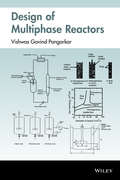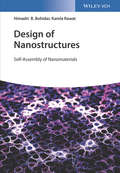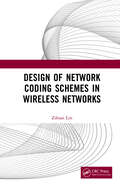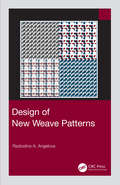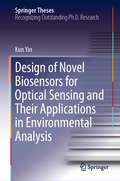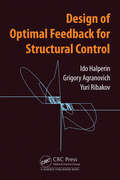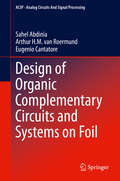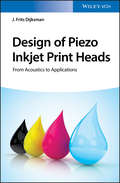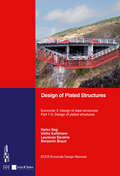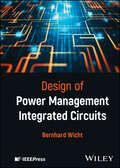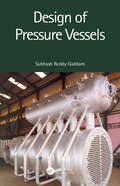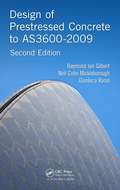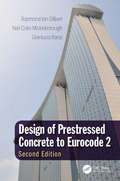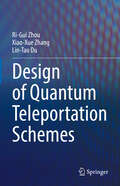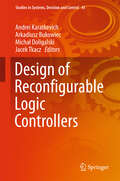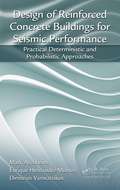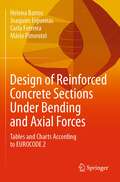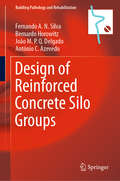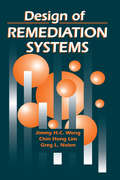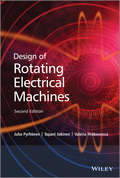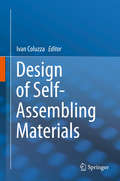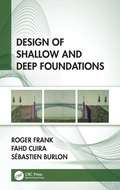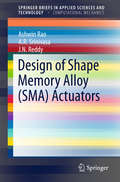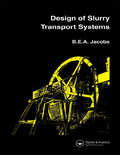- Table View
- List View
Design of Multiphase Reactors
by Vishwas G. PangarkarDetails simple design methods for multiphase reactors in the chemical process industriesIncludes basic aspects of transport in multiphase reactors and the importance of relatively reliable and simple procedures for predicting mass transfer parametersDetails of design and scale up aspects of several important types of multiphase reactorsExamples illustrated through design methodologies presenting different reactors for reactions that are industrially importantIncludes simple spreadsheet packages rather than complex algorithms / programs or computational aid
Design of Nanostructures: Self-Assembly of Nanomaterials
by Himadri B. Bohidar Kamla RawatAdopting a unique approach, this book provides a thorough, one-stop introduction to nanoscience and self-assembly of nanomaterials composed of such materials as metals, metal oxides, metal sulphides, polymers, and biopolymers. Clearly divided into three sections covering the main aspects of nanoscience, the first part deals with the basic principles of nanoscale science. Alongside essential approaches and forces, this section also covers thermodynamics, phase transitions, and applications to biological systems. The second and third parts then go on to provide a detailed description of the synthesis of inorganic and organic nanoparticles, respectively. With its interdisciplinary content of importance to many different branches of nanoscience, this is essential reading for material scientists, physicists, biophysical chemists, chemical engineers, and biotechnologists alike.
Design of Network Coding Schemes in Wireless Networks
by Zihuai LinThis book provides a consolidated view of the various network coding techniques to be implemented at the design of the wireless networks for improving its overall performance. It covers multiple sources communicating with multiple destinations via a common relay followed by network coded modulation schemes for multiple access relay channels. Performance of the distributed systems based on distributed convolutional codes with network coded modulation is covered including a two-way relay channel (TWRC). Two MIF protocols are proposed including derivation of signal-to-noise ratio (SNR) and development of threshold of the channel conditions of both. Features: Systematically investigates coding and modulation for wireless relay networks. Discusses how to apply lattice codes in implementing lossless communications and lossy source coding over a network. Focusses on theoretical approach for performance optimization. Includes various network coding strategies for different networks. Reviews relevant existing and ongoing research in optimization along with practical code design. This book aims at Researchers, Professionals and Graduate students in Networking, Communications, Information, Coding Theory, Theoretical Computer Science, Performance Analysis and Resource Optimization, Applied Discrete Mathematics, and Applied Probability.
Design of New Weave Patterns
by Radostina A. AngelovaThis book presents a systematic study on methods used for the creation of weave patterns for simple structures. Firstly, it explains known techniques for designing new weave patterns classified as patterns merge, motifs, patterns insertion and change of the displacement number. These are discussed as possibilities to create different textures and weaving effects supported by figures of patterns, colour view, and fabric appearance simulation. Secondly, it explains original methods for design of new weave patterns based on Boolean operations, musical scores, written texts and braille alphabet, including transformations performed, advantages/disadvantages, possible applications and designs.
Design of Novel Biosensors for Optical Sensing and Their Applications in Environmental Analysis (Springer Theses)
by Kun YinThis book introduces readers to the development of novel optical biosensors for environmental analysis. Environmental pollution has now become a serious problem, which threatens the health of human beings. Traditional analytical methods have a number of drawbacks, such as the need for professional operators and complicated instruments. After millions of years of evolution, biomolecules can perform various functions with good accuracy and efficiency due to their unique structures, offering a viable alternative to traditional methods. This work focuses on using new biological sensing strategies, e.g. those based on special biomaterials, bio-reactions or living cells, to establish novel biosensors. As these biosensors offer satisfactory optical response performance, they can be used to transform the recognition behavior of specific targets into optical signals and effectively detect target objects.
Design of Optimal Feedback for Structural Control
by Yuri Ribakov Ido Halperin Grigory AgranovichStructural control is an approach aimed at the suppressing unwanted dynamic phenomena in civil structures. It proposes the use of methods and tools from control theory for the analysis and manipulation of a structure’s dynamic behavior, with emphasis on suppression of seismic and wind responses. This book addresses problems in optimal structural control. Its goal is to provide solutions and techniques for these problems by using optimal control theory. Thus, it deals with the solution of optimal control design problems related to passive and semi-active controlled structures. The formulated problems consider constraints and excitations which are common in structural control. Optimal control theory is used in order to solve these problems in a rigorous manner. Even though there are many works in this field, none comprise optimization techniques with firm theoretical background that address the solution of passive and semi-active structural control design problems. The book begins with a discussion on models which are commonly used for civil structures and control actuators. Modern theoretical notions, such as dissipativity and passivity of dynamic systems are discussed in context of the addressed problems. Optimal control theory and suitable successive methods are reviewed. Novel solutions for optimal passive and semi-active control design problems are derived, based on firm theoretical foundations. These results are verified by numerical simulations of typical civil structures which are subjected to different types of dynamic excitations.
Design of Organic Complementary Circuits and Systems on Foil
by Arthur Van Roermund Eugenio Cantatore Sahel AbdiniaThis book describes new approaches to fabricate complementary organic electronics and focuses on the design of circuits and practical systems created using these manufacturing approaches. The authors describe two state-of-the-art, complementary organic technologies, characteristics and modeling of their transistors and their capability to implement circuits and systems on foil. Readers will benefit from the valuable overview of the challenges and opportunities that these extremely innovative technologies provide.
Design of Piezo Inkjet Print Heads: From Acoustics to Applications
by J. Frits DijksmanAn integral overview of the theory and design of printheads, authored by an expert with over 30 years' experience in the field of inkjet printing. Clearly structured, the book presents the design of a printhead in a comprehensive and clear form, right from the start. To begin with, the working principle of piezo-driven drop-on-demand printheads in theory is discussed, building on the theory of mechanical vibrations and acoustics. Then the design of single-nozzle as well as multi-nozzle printheads is presented, including the importance of various parameters that need to be optimized, such as viscosity, surface tension and nozzle shape. Topics such as refilling the nozzle and the impact of the droplet on the surface are equally treated. The text concludes with a unique set of worked-out questions for training purposes as well as case studies and a look at what the future holds. An essential reference for beginning as well as experienced researchers, from ink developers to mechanical engineers, both in industry and academia.
Design of Plated Structures: Eurocode 3: Design of Steel Structures, Part 1-5: Design of Plated Structures (Essentials Ser.)
by Laurence Davaine Ulrike Kuhlmann Benjamin Braun Darko BegThe main aim of this book is to provide practical advice to designers of plated structures for correct and efficient application of EN 1993-1-5 design rules. In chapter 1 the purpose, the scope and the structure of the book is explained. In chapter 2 a rather detailed and commented overview of EN 1993-1-5 design rules is given following the structure of the standard. Shear lag effect as well as plate buckling problems due to direct stresses, shear forces, transverse forces and interactions of these effects are covered. This chapter also includes a reduced stress method and a finite element analysis approach to plate buckling problems. A large number of design examples illustrate the proper application of individual design rules. Chapter 3 and 4 bring two complete design examples on a crane runway and a box-girder bridge.
Design of Power Management Integrated Circuits (IEEE Press)
by Bernhard WichtDesign of Power Management Integrated Circuits Comprehensive resource on power management ICs affording new levels of functionality and applications with cost reduction in various fields Design of Power Management Integrated Circuits is a comprehensive reference for power management IC design, covering the circuit design of main power management circuits like linear and switched-mode voltage regulators, along with sub-circuits such as power switches, gate drivers and their supply, level shifters, the error amplifier, current sensing, and control loop design. Circuits for protection and diagnostics, as well as aspects of the physical design like lateral and vertical power delivery, pin-out, floor planning, grounding/supply guidelines, and packaging, are also addressed. A full chapter is dedicated to the design of integrated passives. The text illustrates the application of power management integrated circuits (PMIC) to growth areas like computing, the Internet of Things, mobility, and renewable energy. Includes numerous real-world examples, case studies, and exercises illustrating key design concepts and techniques. Offering a unique insight into this rapidly evolving technology through the author’s experience developing PMICs in both the industrial and academic environment, Design of Power Management Integrated Circuits includes information on: Capacitive, inductive and hybrid DC-DC converters and their essential circuit blocks, covering error amplifiers, comparators, and ramp generators Sensing, protection, and diagnostics, covering thermal protection, inductive loads and clamping structures, under-voltage, reference and power-on reset generation Integrated MOS, MOM and MIM capacitors, integrated inductors Control loop design and PWM generation ensuring stability and fast transient response; subharmonic oscillations in current mode control (analysis and circuit design for slope compensation) DC behavior and DC-related circuit design, covering power efficiency, line and load regulation, error amplifier, dropout, and power transistor sizing Commonly used level shifters (including sizing rules) and cascaded (tapered) driver sizing and optimization guidelines Optimizing the physical design considering packaging, floor planning, EMI, pinout, PCB design and thermal design Design of Power Management Integrated Circuits is an essential resource on the subject for circuit designers/IC designers, system engineers, and application engineers, along with advanced undergraduate students and graduate students in related programs of study.
Design of Pressure Vessels
by Subhash Reddy GaddamPressure vessels are prone to explosion while in operation, due to possible errors in material selection, design and other engineering activities. Addressing issues at hand for a working professional, this book covers material selection, testing and design of pressure vessels which enables users to effectively use code rules and available design softwares. Relevant equation derivations have been simplified with comparison to ASME codes. Analysis of special components flange, bellow and tube sheet are included with their background. Topics on tube bend, supports, thermal stresses, piping flexibility and non-pressure parts are described from structural perspective. Vibration of pressure equipment components are covered as well.
Design of Prestressed Concrete to AS3600-2009
by Gianluca Ranzi Neil Colin Mickleborough Raymond Ian GilbertThe design of structures in general, and prestressed concrete structures in particular, requires considerably more information than is contained in building codes. A sound understanding of structural behaviour at all stages of loading is essential. This textbook presents a detailed description and explanation of the behaviour of prestressed concret
Design of Prestressed Concrete to Eurocode 2, Second Edition
by Gianluca Ranzi Neil Colin Mickleborough Raymond Ian GilbertThe design of structures in general, and prestressed concrete structures in particular, requires considerably more information than is contained in building codes. A sound understanding of structural behaviour at all stages of loading is essential. This textbook presents a detailed description and explanation of the behaviour of prestressed concrete members and structures both at service loads and at ultimate loads and, in doing so, provide a comprehensive and up-to-date guide to structural design. Much of the text is based on first principles and relies only on the principles of mechanics and the properties of concrete and steel, with numerous worked examples. However, where the design requirements are code specific, this book refers to the provisions of Eurocode 2: Design of Concrete Structures and, where possible, the notation is the same as in Eurocode 2. A parallel volume is written to the Australian Standard for Concrete Structures AS3600-2009. The text runs from an introduction to the fundamentals to in-depth treatments of more advanced topics in modern prestressed concrete structures. It suits senior undergraduate and graduate students and also practising engineers who want comprehensive introduction to the design of prestressed concrete structures. It retains the clear and concise explanations and the easy-to-read style of the first edition, but the content has been extensively re-organised and considerably expanded and updated. New chapters cover design procedures, actions and loads; prestressing systems and construction requirements; connections and detailing; and design concepts for prestressed concrete bridges. The topic of serviceability is developed extensively throughout. All the authors have been researching and teaching the behaviour and design of prestressed concrete structures for over thirty-five years and the proposed new edition of the book reflects this wealth of experience. The work has also gained much from Professor Gilbert active and long-time involvement in the development of standards for concrete buildings and concrete bridges.
Design of Quantum Teleportation Schemes
by Ri-Gui Zhou Xiao-Xue Zhang Lin-Tao DuThis book offers a design-centered approach to quantum teleportation as well as in-depth analysis of various quantum teleportation schemes. Quantum teleportation, a vital component of practical quantum communication technologies, serves as a secure and reliable way to transmit confidential information. Quantum teleportation relies on the unique physical property of quantum superposition, accomplishing the remote transmission of information through unitary transformations and measurements on entangled states, combined with classical communication. Therefore, as one of the safe and reliable means of quantum state transmission between communicating parties, quantum teleportation is bound to play a vital role in future quantum communication. This book begins with the basics of quantum teleportation before going on to consider various refinements such as controlled, bidirectional, cyclic, symmetric, and asymmetric scenarios. It goes further, investigating a multitude of quantum teleportation schemes in bidirectional, controlled bidirectional, cyclic bidirectional, asymmetric cyclic controlled, and noisy environments, and conducts detailed performance analyses of these schemes. This book is an essential resource for students, researchers, and professionals in the field of quantum communications.
Design of Reconfigurable Logic Controllers (Studies in Systems, Decision and Control #45)
by Andrei Karatkevich Arkadiusz Bukowiec Michał Doligalski Jacek TkaczThis book presents the original concepts and modern techniques for specification, synthesis, optimisation and implementation of parallel logical control devices. It deals with essential problems of reconfigurable control systems like dependability, modularity and portability. Reconfigurable systems require a wider variety of design and verification options than the application-specific integrated circuits. The book presents a comprehensive selection of possible design techniques. The diversity of the modelling approaches covers Petri nets, state machines and activity diagrams. The preferences of the presented optimization and synthesis methods are not limited to increasing of the efficiency of resource use. One of the biggest advantages of the presented methods is the platform independence, the FPGA devices and single board computers are some of the examples of possible platforms. These issues and problems are illustrated with practical cases of complete control systems. If you expect a new look at the reconfigurable systems designing process or need ideas for improving the quality of the project, this book is a good choice.g process or need ideas for improving the quality of the project, this book is a good choice.
Design of Reinforced Concrete Buildings for Seismic Performance: Practical Deterministic and Probabilistic Approaches
by Mark Aschheim Enrique Hernández-Montes Dimitrios VamvatsikosThe costs of inadequate earthquake engineering are huge, especially for reinforced concrete buildings. This book presents the principles of earthquake-resistant structural engineering, and uses the latest tools and techniques to give practical design guidance to address single or multiple seismic performance levels. It presents an elegant, simple and theoretically coherent design framework. Required strength is determined on the basis of an estimated yield displacement and desired limits of system ductility and drift demands. A simple deterministic approach is presented along with its elaboration into a probabilistic treatment that allows for design to limit annual probabilities of failure. The design method allows the seismic force resisting system to be designed on the basis of elastic analysis results, while nonlinear analysis is used for performance verification. Detailing requirements of ACI 318 and Eurocode 8 are presented. Students will benefit from the coverage of seismology, structural dynamics, reinforced concrete, and capacity design approaches, which allows the book to be used as a foundation text in earthquake engineering.
Design of Reinforced Concrete Sections Under Bending and Axial Forces: Tables and Charts According to EUROCODE 2
by Carla Ferreira Helena Barros Joaquim Figueiras Mário PimentelThis book contains auxiliary calculation tools to facilitate the safety assessment of reinforced concrete sections. Essential parameters in the design to the ultimate limit state of resistance such as the percentage of reinforcement and the position of the neutral axis in concrete cross-sections, as well as the control of the maximum stresses in service limit states are provided by these tools. A set of tables, charts and diagrams used to design cross-sections of reinforced and prestressed concrete structures are supplied. The most current beams and columns cross-sections namely, rectangular, circular and T-sections are considered. These tools have been prepared in line with the provisions of the new European regulations, with particular reference to Eurocode 2 – Design of Concrete Structures. The book stands as an ideal learning resource for students of structural design and analysis courses in civil engineering, building construction and architecture, as well as a valuable reference for concrete structural design professionals in practice.
Design of Reinforced Concrete Silo Groups (Building Pathology and Rehabilitation #10)
by António C. Azevedo Fernando A.N. Silva Bernardo Horowitz João M.P.Q. DelgadoThis book offers a new calculation procedure of the structural behavior of grouped layout of silos, easy to use and with satisfactory responses. Groups of reinforced concrete silos are structures commonly used in the food industry, where it is usually necessary to separate the storage of different types and sources of grain. The grouped layout of silos has numerous benefits when compared with single-cell silos in which the emphasis is on creating further space for silage, normally referred to as interstice – a space formed between the edges of the group’s cells. This economic benefit, on the other hand, raises a structural problem for the designer of this type of building, which is to assess the magnitude of bending moments and hoop forces due to the structural continuity of the walls in the interstice region of the cells. Bending moments assume extreme values exactly when the interstice is loaded and the other cells in the group are empty. To develop the formulation of the proposed analysis models, a parametric study was carried out that allowed the adequate consideration of the variables involved. The idea is to help professionals, engineers, industrials and academics involved in this advanced interdisciplinary field as a comprehensive guide for courses offered at different levels of learning (undergraduate and postgraduate).
Design of Remediation Systems
by Jimmy H. Wong Chin Hong Lim Greg L. NolenWhile numerous books are available on remediation systems, this is the first work to document and explain in full the design aspects of the subject. Based on sound engineering principles and practical construction considerations, this text explains the entire process of remediation design, from assessment to completion, and provides engineers with the tools they need to conduct a pilot test, apply the results, and design a practical, efficient system.Design of Remediation Systems first establishes the underlying principles behind each technology, then outlines the standard procedures for designing a system. This comprehensive manual explains feasibility and pilot tests, data evaluation, design considerations and parameters, calculations and equations, and construction aspects of the system. Also featured are discussions of the operation and maintenance of systems, and analysis of current trends, such as combining soil vapor extraction with air sparging. Detailed case study examples are included in each chapter. The book considers petroleum hydrocarbons as the primary contaminant, but the principles and procedures can be applied to a wide range of other contaminants.This hands-on text/reference presents a complete picture of remediation system design for engineers, students, and scientists. No other single work offers the thorough coverage of this critical aspect of remediation.
Design of Rotating Electrical Machines
by Tapani Jokinen Valeria Hrabovcova Juha PyrhonenIn one complete volume, this essential reference presents an in-depth overview of the theoretical principles and techniques of electrical machine design. This timely new edition offers up-to-date theory and guidelines for the design of electrical machines, taking into account recent advances in permanent magnet machines as well as synchronous reluctance machines.New coverage includes:Brand new material on the ecological impact of the motors, covering the eco-design principles of rotating electrical machinesAn expanded section on the design of permanent magnet synchronous machines, now reporting on the design of tooth-coil, high-torque permanent magnet machines and their propertiesLarge updates and new material on synchronous reluctance machines, air-gap inductance, losses in and resistivity of permanent magnets (PM), operating point of loaded PM circuit, PM machine design, and minimizing the losses in electrical machines>End-of-chapter exercises and new direct design examples with methods and solutions to real design problems>A supplementary website hosts two machine design examples created with MATHCAD: rotor surface magnet permanent magnet machine and squirrel cage induction machine calculations. Also a MATLAB code for optimizing the design of an induction motor is providedOutlining a step-by-step sequence of machine design, this book enables electrical machine designers to design rotating electrical machines. With a thorough treatment of all existing and emerging technologies in the field, it is a useful manual for professionals working in the diagnosis of electrical machines and drives. A rigorous introduction to the theoretical principles and techniques makes the book invaluable to senior electrical engineering students, postgraduates, researchers and university lecturers involved in electrical drives technology and electromechanical energy conversion.
Design of Self-Assembling Materials
by Ivan ColuzzaThis book provides in-depth insights into assembling dynamics of proteins, DNA and other nanoparticles. The applications of basic knowledge in the development of artificial self-assembling systems will be discussed and state of the art methodology in the field will be presented.This interdisciplinary work brings together aspects of different fields of expertise such as Biology, Physics and Material Sciences and is intended for researchers, professors and graduate students interested in the design of self-assembling materials.
Design of Shallow and Deep Foundations
by Roger Frank Fahd Cuira Sébastien BurlonDesign of Shallow and Deep Foundations introduces the concept of limit state calculations, before focusing on shallow and deep foundations. The limit state combinations of actions are examined, and practical calculation models of the bearing capacity and of the settlement are presented, particularly from the results of Ménard pressuremeter tests and cone penetration tests. Attention is also given to the use of numerical methods, which has been developed over the past twenty years. It provides an overview of various elements of ground-structure interaction that are pertinent for a refined design of both shallow and deep foundations, such as allowable displacements of structures, and ground-structure couplings. This guide will be useful to practising engineers and experts in design offices, contracting companies and administrations, as well as students and researchers in civil engineering. Though its focus is generally on the French practice, it is more widely applicable to design based on, or generally in line with, Eurocode 7, with references to BS ENs. Roger Frank is an Honorary Professor at Ecole Nationale des Ponts et Chaussées (ENPC). From 1998 to 2004, he chaired the committee on Eurocode 7 on Geotechnical design. Fahd Cuira is the Scientific Director of Terrasol (Setec group), France. Since 2018, he has been in charge of the course on the design of geotechnical structures at ENPC. Sébastien Burlon is a Project Director at Terrasol (Setec group), France. He is involved in the evolution of Eurocode 7 and teaches several geotechnical courses, especially at ENPC.
Design of Shape Memory Alloy (SMA) Actuators
by J. N. Reddy Ashwin Rao A. R. SrinivasaThis short monograph presents an analysis and design methodology for shape memory alloy (SMA) components such as wires, beams, and springs for different applications. The solid-solid, diffusionless phase transformations in thermally responsive SMA allows them to demonstrate unique characteristics like superelasticity and shape memory effects. The combined sensing and actuating capabilities of such materials allows them to provide a system level response by combining multiple functions in a single material system. In SMA, the combined mechanical and thermal loading effects influence the functionality of such materials. The aim of this book is to make the analysis of these materials accessible to designers by developing a "strength of materials" approach to the analysis and design of such SMA components inspired from their various applications with a review of various factors influencing the design process for such materials.
Design of Sigma-Delta Converters in MATLAB®/Simulink®
by Isacco ArnaldiThis textbook is intended for a semester-length course in Sigma-Delta converters. The author minimizes his use of mathematical theory, emphasizes real-use cases, and discuses concepts in a way to be accessible to inexperienced students and entry-level, practicing engineers. Little or no prior knowledge of Sigma-Delta converters and/or MATLAB/Simulink is assumed. Readers will learn what the design process involves, the trade-offs to consider, how a modulator is actually simulated and how to consider a specific design successful. Each chapter is begins with the essential, practical information, while the necessary, theoretical concepts are presented through results evaluation of the suggested simulation exercises of the modulators supplied in the MATLAB/Simulink Toolbox software accompanying this book.
Design of Slurry Transport Systems
by B.E.A. JacobsThis book benefits users, manufacturers and engineers by drawing together an overall view of the technology. It attempts to give the reader an appreciation of the extent to which slurry transport is presently employed, the theoretical basis for pipeline design, the practicalities of design and new developments.
